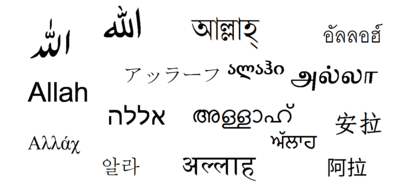allah



God in Islam
Allah (/ˈæl.lə, ˈɑːl.lə, əˈl.lɑː/;[1][2] Arabic: اللَّٰه, romanized: Allāh, IPA: [ʔaɫ.ɫaːh] (listen)) is the common Arabic word for God. In the English language, the word generally refers to God in Islam.[3][4][5] The word is thought to be derived by contraction from al–ilāh, which means “the god”, and is linguistically related to the Aramaic words Elah and Syriac ܐܲܠܵܗܵܐ (ʼAlāhā) and the Hebrew word El (Elohim) for God.[6][7]
The word Allah has been used by Arabic people of different religions since pre-Islamic times.[8] The pre-Islamic Arabs worshipped a supreme deity whom they called Allah, alongside other lesser deities.[9] Muhammad used the word Allah to indicate the Islamic conception of God. Allah has been used as a term for God by Muslims (both Arab and non-Arab) and even Arab Christians[10] after the term “al–ilāh” and “Allah” were used interchangeably in Classical Arabic by the majority of Arabs who had become Muslims. It is also often, albeit not exclusively, used in this way by Bábists, Baháʼís, Mandaeans, Indonesian and Maltese Christians, and Sephardi Jews.[11][12][13][14] Similar usage by Christians and Sikhs in West Malaysia has recently led to political and legal controversies.
Pre-Islamic Arabians
See also: Religion in pre-Islamic Arabia
Regional variants of the word Allah occur in both pagan and Christian pre-Islamic inscriptions.[8][23] Different theories have been proposed regarding the role of Allah in pre-Islamic polytheistic cults. According to the Islamic scholar Ibn Kathir, Arab pagans considered Allah as an unseen God who created and controlled the Universe. Pagans believed worship of humans or animals who had lucky events in their life brought them closer to God. Pre-Islamic Meccans worshiped Allah alongside a host of lesser gods and those whom they called the “daughters of Allah.”[24] Islam forbade worship of anyone or thing other than God.[25] Some authors have suggested that polytheistic Arabs used the name as a reference to a creator god or a supreme deity of their pantheon.[26][27] The term may have been vague in the Meccan religion.[26][28] According to one hypothesis, which goes back to Julius Wellhausen, Allah (the supreme deity of the tribal federation around Quraysh) was a designation that consecrated the superiority of Hubal (the supreme deity of Quraysh) over the other gods.[8] However, there is also evidence that Allah and Hubal were two distinct deities.[8] According to that hypothesis, the Kaaba was first consecrated to a supreme deity named Allah and then hosted the pantheon of Quraysh after their conquest of Mecca, about a century before the time of Muhammad.[8] Some inscriptions seem to indicate the use of Allah as a name of a polytheist deity centuries earlier, but nothing precise is known about this use.[8] Some scholars have suggested that Allah may have represented a remote creator god who was gradually eclipsed by more particularized local deities.[29][30] There is disagreement on whether Allah played a major role in the Meccan religious cult.[29][31] No iconic representation of Allah is known to have existed.[31][32] Allah is the only god in Mecca that did not have an idol.[33] Muhammad’s father’s name was ʿAbd-Allāh meaning “the slave of Allāh”.[28]